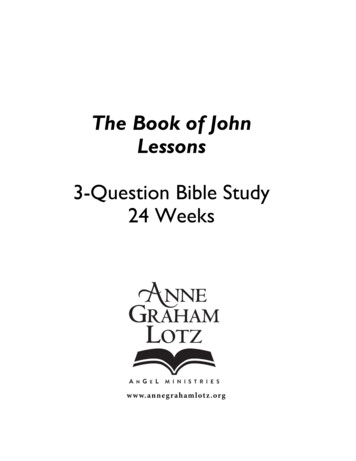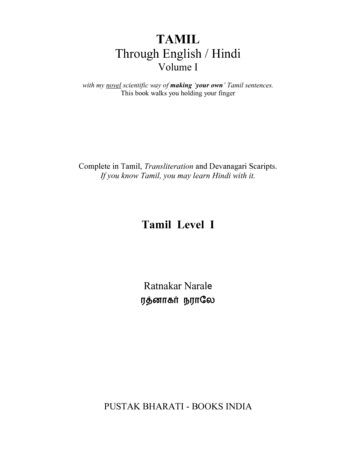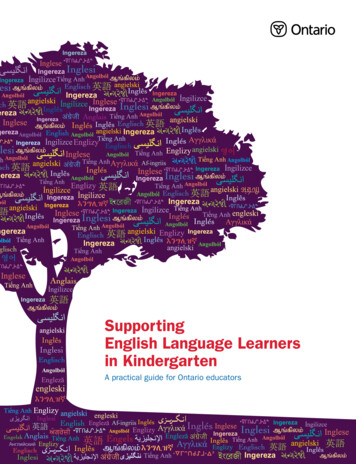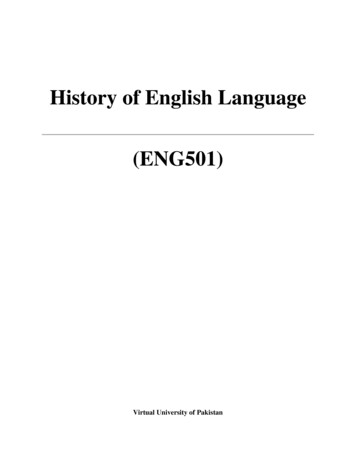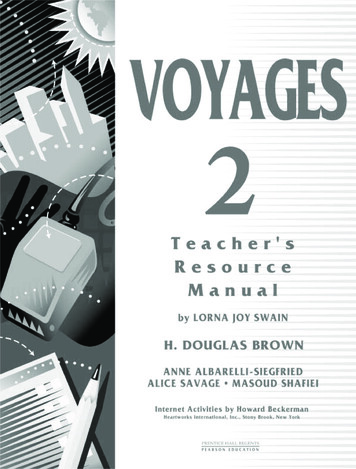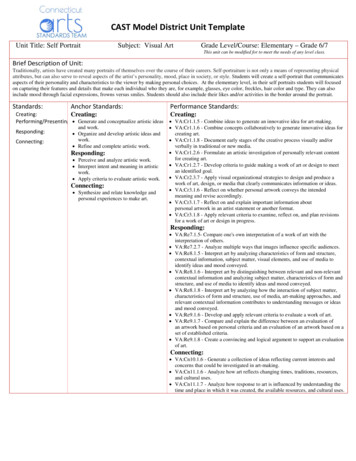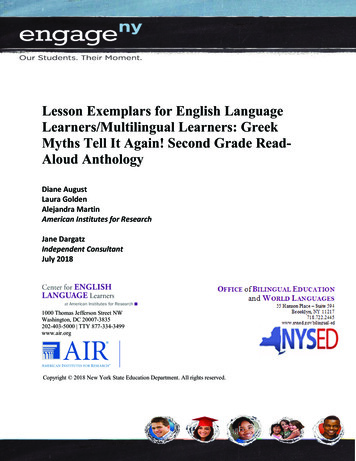
Transcription
Our Students.· Their Moment.Lesson Exemplars for English LanguageLearners/Multilingual Learners: GreekMyths Tell It Again! Second Grade ReadAloud AnthologyDiane AugustLaura GoldenAlejandra MartinAmerican Institutes for ResearchJane DargatzIndependent ConsultantJuly 2018Center for ENGLISHLANGUAGE Learnersat American Institutes for ResearCh O FFICE ofBILINGUALED UCATIONand WORLD L ANGUAGES1000 Thomas Jefferson Street NWWashington, DC 20007-3835202-403-5000 TTY 877-334-3499www.air.orgiiAIRA.\rnlUCAN INSTITUTtS FOR RESEARCH Copyright 2018 New York State Education Department. All rights reserved.55 Hanson Place - Suite 594Brooklyn, NY 11217718.722.244 5-tNYSED
engage"YContents1: The Twelve Gods of Mount Olympus .12: Prometheus and Pandora.123: Demeter and Persephone .224: Arachne the Weaver.325: Theseus and the Minotaur .406: Daedalus and Icarus .517: Hercules .598: Other Adventures of Hercules.679: Oedipus and the Riddle of the Sphinx .7910: Atalanta and the Golden Apples .87Greek Myths Grade 2—i
engage"Y1: The Twelve Gods of Mount Olympus 1Lesson ObjectivesCore Vocabularyglimpse, n. A brief or quick lookExample: Jan snuck into the kitchen before the party to get a glimpse of her birthdaycake. Jan looked at her birthday cake quickly and then left.Variation(s): glimpsessanctuary, n. A holy place; a safe, protected placeExample: The voices of the choir filled the sanctuary.Variation(s): sanctuariessecurely, adv. Tightly or firmlyExample: Kaiyo and her mother attached their bikes securely to the back of the car.They did not want to lose their bikes.Variation(s): to secure (verb)spectators, n. Observers; people watching an event, a game or a showExample: Spectators come from distant (faraway) cities to watch the Olympics.Variation(s): spectatortending, v. Taking care of, or caring for, someone or somethingExample: On Saturday mornings, Carl could always be found outside tending hisgarden.Variation(s): tend, tends, tendedIntroducing the Read-AloudWhere Are We?Show students a world map or globe; ask a volunteer to locateGreece. If students cannot locate it, point to the country of presentday Greece. Tell students that this is Greece today, andthat eventhough it occupies a very small area now, it was once the center ofa very large civilization. Show students Poster 1 (Mapof AncientGreece) from The Ancient Greek Civilization domain. Tell and/orremind students that the area on the Poster from the Black Sea to theMediterranean Sea—including Crete—represents ancientGreece, acivilization from a very long time ago.1The additional supports added to the lessons are in italicized red font.Greek Myths Grade 2—1
engage"YWhat Do We Know?Ask students to share what they have already learned about theancient Greek civilization. You may wish to refer to the CivilizationsChart from The Ancient Greek Civilization domain to help studentsremember the various components of this civilization.Domain IntroductionTell students that, like people in many civilizations, the ancientGreeks told stories orally, or by word of mouth. Share that thesestories usually had supernatural beings or heroes as the maincharacters, and the plots usually explained events in nature or taughtpeople how to behave. Explain that in ancient times people did nothave the knowledge that people have today. Tell students that, as aresult, these stories, which were later written down, were firstthought to be factual, but it is now known that they are fictional, ornot true. Share with students that we call such oral stories myths.Students who participated in the Core Knowledge Language Artsprogram in Grade 1 will have heard about myths in the Astronomydomain and learned how many different ancient peoples told mythsabout the stars and constellations they saw in the sky. You maywish to solicit their knowledge of this topic to share with theclass.Tell students that over the next couple of weeks, they are goingtohear many well-known Greek myths, or myths that originatedinancient Greece. Share with students that these myths includeseveral fascinating characters, many of whom are gods andgoddesses who were worshipped by the ancient Greeks.Studentswho participated in the Core Knowledge Language Artsprogram in Grade 1 will remember that gods and goddesses arebeings believed to have supernatural powers and were worshippedby others. Remind students of this definition. Ask students toshare the names of any gods and/or goddesses they rememberfrom TheAncient Greek Civilization domain. You may wish toprompt them with the following questions:1.Of gods and goddesses, which are male beings and which arefemale beings? (Gods are male beings, and goddesses arefemale beings.)2.Where did the Greek gods and goddesses live, according tothe ancient Greeks? Show me the location on The AncientGreek Civilization Poster 1. (The Greeks believed that the mostpowerful of these gods and goddesses lived in a palaceon thevery top of Mount Olympus, the highest mountain in Greece.)Greek Myths Grade 2—2
engage"Y3.Who did the ancient Greeks believe ruled these gods andgoddesses? (a king named Zeus and a queen named Hera)Meet the CharactersExplain that before each read-aloud students will have anopportunity to meet the characters in the story by looking at a fewimages and hearing the characters’ names.Note: As you take students through the Meet the Characters sectionof Introducing the Read-Aloud in each lesson, you may wish tocreate a Character Chart similar to the one that follows and fill inrelevant information about the characters as they are introduced.You may wish to add to the chart throughout the domain and use thechart for reference. Please note that most of the characters’ namesare not decodable for students in Grade 2 and students should not beexpected to be able to read the names. You mayhave some studentswho can read some of the names or who may enjoy recognizingthem as a result of the repetition throughout the domains as they seethe names, listen to the stories, and view theillustrations ofcharacters. You will need to add additional rows tothe chart foreach lesson’s read-aloud.Role of the StoryCharacter NameDescription ofCharacter (god,goddess, mythologicalcreature, human)Leonidashumansontraveler to OlympiaCyrushumanfather and pottertraveler to Olympia Show image 1A-4: Olympians on their thronesTell students that the first myth they will hear is called “TheTwelveGods of Mount Olympus.” Remind students that the imageshows some of the Greek gods and goddesses. Tell students that intoday’s story they will hear the names of each of these gods andgoddesses and learn a little about them. Ask a student to point toZeus and Hera on their thrones. Ask students if they rememberfrom Ancient Greek Civilizations if the gods and goddesses all havethe same powers.Greek Myths Grade 2—3
engage"Y Show image 1A-2: Leonidas and his father preparing the cartTell students that in today’s story, they will hear about Cyrus andhis son Leonidas who are going to the footraces at Olympia to selltheir pottery.Purpose for ListeningTell students to listen carefully to find out the twelve main gods andgoddesses the ancient Greeks worshipped.Presenting the Read-AloudThe Twelve Gods of Mount Olympus Show image 1A-1: Say: Leonidas waking up. [Point toLeonidas.]or caring forIf Leonidas and his fatherare going to harness thehorses, they are going toattach straps and bands tothem to have control overthem as the animals pull thecart.12Pottery is the name forvases, pots, bowls, orplates shaped from moistclay and hardened by heat.Many groups of peoplehave made pottery, e.g.,Native Americans,Mayans, Aztecs, etc.34or celebrationsThis is a story about Leonidas. Leonidas was a human boy. Cyruswas Leonidas’s father. Leonidas and Cyrus lived in Ancient Greece. 2Leonidas woke up early on the day of the footraces, or runningraces. Still lying in bed, he could hear his father, Cyrus, outsidetending1 the horses. Cyrus was taking care of the horses.“He’s probably feeding them,” Leonidas thought to himself.“And then we’ll harness, or connect, them to the cart and make ourway to Olympia.”2Who is Leonidas’ father? What is Leonidas’ father doing?Olympia was the site, or place, of the day’s footraces in honor ofZeus, the leader of all the Greek gods and goddesses. Leonidas andhis father would take their pottery to sell to the people at the races,and when they had sold all they could, they would watch the races.3What are Leonidas and his father going to do today?Leonidas knew that if he asked, his father would tell him againhow the gods and goddesses came to be, and why he and the otherGreeks honored them with races, festivals,4 and feasts. It was hisfavorite story, and he loved to hear his father tell it.But first, Leonidas had to get out of bed and get dressed;otherwise, he wouldn’t get to hear that story or see the races at all.After breakfast he went outside to help his father, Cyrus, who hadjust finished harnessing the first of their two horses to the cart.How will Leonidas and his father get to the races?2In some cases, AIR staff have added background information when we thought it was important.Greek Myths Grade 2—4
engage"Y 5 or6tightlyor thick board7 [Point to the woodenplank in the next image] Show image 1A-2: Say: Leonidas and his father preparing thecart. [Point to the cart.]“Good morning, father,” Leonidas said.“Good morning, son! We’re almost ready to go. Will you help meharness this last horse?”Leonidas nodded, and together, as the sun burnt away the morningfog, father and son harnessed the second horse. Once they doublechecked that the horses were securely5 fastened to the cart, Leonidasand Cyrus finished storing, or placing, their pottery safely in the cart.Then, taking their seats, or sitting down, on a wooden plank6 at thefront of the cart, they started their journey, or trip, to Olympia.7 Whatdid Leonidas and his father do before they left on their trip? Show image 1A-3: Say: Leonidas’s father pointing to MountOlympus8 [Point to Mount Olympus.]8 Howdo you thinkLeonidas feels about goingto Olympia to see the racesheld in honor of Zeus?9 A sanctuary is a holyplace. The Olympian godsbeing celebrated in thissanctuary were the gods andgoddesses whom the Greeksbelieved lived on MountOlympus.10 Waresare goods. Whatwares did Cyrus andLeonidas have in theircart?After they’d traveled, some miles down the road, Leonidas asked,“Father, will you tell me again the story of the gods and goddesses?”“Of course, son. As you know, we’re going to Olympia for thefootraces held in honor of Zeus. Olympia is the home of an importantsanctuary devoted to Zeus, where we celebrate him and the otherOlympian gods and goddesses with sporting competitions9, orcontests, races, and games. What are they going to Olympia to see?The twelve gods of Mount Olympus are the most powerful of all ofthe many gods, and Zeus is their leader. Of course, Mount Olympusis actually far away, but this is a beautiful valley, beloved to, or lovedby, them and perfect for the games.”Their cart went over a bump, and Cyrus turned around to checktheir wares briefly before continuing the story.10 Cyrus quicklychecked to make sure their pottery was safe in the cart. “These godsand goddesses can sometimes be just like you and me: they can feelhappy or sad, jealous and angry, or generous and loving. Unlike youor me, they have special powers to control things like the seasons andthe weather, when and where there is war, and, sometimes, withwhom we fall in love! And unlike you and me, the gods areimmortal—that means they never die.” How are gods and goddesseslike people? How are gods and goddesses different than people?Greek Myths Grade 2—5
engage"Y Show image 1A-4: Say: Olympians on their thrones. [Point tothe Olympians.]or humans who are bornand later die11Thrones are special chairs. Look at the picture. These are thrones.[Point to the thrones in the picture.] Who are the people on thethrones?Cyrus paused before continuing on with Leonidas’s favorite partof the story. “That’s how the gods are different from mortals11 onEarth, but do you know how to tell them apart from one another?”Leonidas did know, but he wanted his father to continue telling thestory, so he said, “Yes, Father, but tell me anyway!” What isLeonidas’s father going to tell him about? Show image 1A-5: Say: Zeus and Poseidon. [Point to Zeus andPoseidon.]Cyrus continued on, saying, “Well, as I said before, Zeus is theleader of all the gods and protects all of us here on Earth. He has avoice like rolling thunder and controls the wind, rain, and lightning,which he also uses as his weapons. Zeus uses the wind, rain, andlightning to fight. Who is Zeus? What does Zeus control?Who can point to thetrident in the illustration?12He has two brothers, Hades and Poseidon, and together they ruleover, or lead, the whole world. While Zeus controls the heavens,Poseidon controls the sea and rules over it with a trident.12 When hestrikes, or hits, the ground with his trident, the earth shakes, and whenhe strikes the seas with it, the waves rise up as tall as a mountain. Whois Poseidon? What does Poseidon control?Zeus and Poseidon are two of the twelve gods who live on MountOlympus and have thrones there.” Thrones are special chairs. Thereare twelve gods who live on Mount Olympus. They have thrones.Where do Zeus and Poseidon live?Who are the three gods in the story so far? How are they related?Leonidas and his father came to a fork in the road, or a placewhere the road goes two different ways, and turned left. They couldnow see other carts ahead of them in the distance—other vendors, orsellers, looking to sell their wares at the footraces in Olympia. Theother people also wanted to sell their things at the races. Show image 1A-6: Say: Hades in the underworld on histhrone. [Point to Hades.]“And what about Hades, Zeus’s other brother?” Leonidas asked.Greek Myths Grade 2—6
engage"Y13or enemy“While Zeus rules the heavens, and Poseidon rules the sea, Hadesrules the underworld, or the land of the dead. Hades has a helmet, orhard hat, that makes him invisible, so that no one, friend or foe,13 cansee him coming. Hades’ throne is in the underworld, where he lives,”Cyrus said. A throne is a special chair. Hades has a throne in theunderworld.Who is Hades? What does Hades control?“He sounds scary,” Leonidas shivered. “Who else lives on MountOlympus?” Show image 1A-7: Say: Demeter and Hera. [Point to Demeterand Hera.]“Well,” Cyrus said, “Zeus also has a sister who has a throne onMount Olympus. Zeus’s sister is Demeter. Demeter has a throne, orspecial chair, on Mount Olympus. Demeter is the goddess of theharvest and grain; she looks after all of the fields and crops on Earth.Demeter takes care of all the plants that grow food.Who is Demeter? What does Demeter control?Zeus’s wife, Hera, also lives on Mount Olympus; she is the queen,or leader, of the gods and goddesses and is the goddess of women’slives. Who is Hera? What does Hera control?Look at the picture. Who are the two goddesses in the picture?How are they related to Zeus?Hmm, how many is that?” Cyrus turned and asked his son.Counting on his fingers, Leonidas said, “Zeus, Poseidon, Demeter,and Hera. Just four . . . who are the other gods and goddesses wholive on Mount Olympus?” Show image 1A-8: Say: Hephaestus, Aphrodite, Athena, andAres. [Point to each and name them.]“Well, there’s Hephaestus, god of fire and the blacksmith of thegods; Aphrodite, goddess of love; Athena, goddess of wisdom; andAres, god of war.” Let’s repeat the names of these gods andgoddesses.Repeat the name: Hephaestus. What does Hephaestus control?Repeat the name: Aphrodite. What does Aphrodite control?Repeat the name: Athena. What does Athena control?Repeat the name: Ares. What does Ares control?Greek Myths Grade 2—7
engage"Y Show image 1A-9: Say: Apollo, Artemis, Hermes, andDionysus. [Point to each and name them.]“Then there are the twins: Apollo, the god of light and music, andhis sister Artemis, the goddess of the hunt. There’s Hermes, themessenger of the gods, and finally, Dionysus, the god of wine and theyoungest of all the gods.Let’s repeat the names of these gods and goddesses.Repeat the name: Apollo. What does Apollo control?Repeat the name: Artemis. What does Artemis control?Repeat the name: Hermes. What does Hermes control?Repeat the name: Dionysus. What does Dionysus control?Even though these are the most powerful of all the gods andgoddesses, Zeus is the strongest of all. And it is he whom we honortoday.” Who is the strongest god? Show image 1A-10: Say: Leonidas and his father arrive at theraces. [Point to Mount Olympus.]Spectators are observers.There are three types ofpeople at the sanctuary ofOlympia: spectatorsobserving the races;vendors selling their wares;and athletes competing inthe races.1415or passing view16 What does Leonidasthink he glimpsed at thetop of Mount Olympus?Cyrus stopped the cart; they had finally reached Olympia.Spectators and vendors moved all around them as the athletes,stretched in preparation for their races.14 Players in the games andraces stretched their muscles to get ready. What is happening inOlympia today? What are the athletes getting ready to do?Leonidas knew that many miles away was cloud-covered MountOlympus. As the midday sun shone through some of the clouds,Leonidas imagined, or pretended, he could see the briefest, glimpse15of a palace with twelve golden thrones.16 Leonidas imagined he couldtake a quick look at the palace on Mount Olympus.Discussing the Read-AloudComprehension QuestionsIf students have difficulty responding to questions, reread pertinentpassages of the read-aloud and/or refer to specific images. If studentsgive one-word answers and/or fail to use read-aloud or domainvocabulary in their responses, acknowledge correct responses byexpanding the students’ responses using richer and more complexlanguage. Ask students to answer in complete sentences by havingthem restate the question in their responses.1. Literal The setting is the place where a story happens. What isGreek Myths Grade 2—8
engage"Ythe setting for this story? (ancient Greece; Olympia) Listenfirst. “As you know, we’re going to Olympia for the footracesheld in honor of Zeus.” (p. 8) What is the setting for thisstory?2. Inferential Why were Leonidas and his father tending to andsecurely harnessing the horses? (They were preparing them for thejourney to the sanctuary at Olympia) Listen first. Leonidas wokeup early on the day of the footraces, or running races. Still lyingin bed, he could hear his father, Cyrus, outside tending the horses.Cyrus was taking care of the horses. “He’s probably feedingthem,” Leonidas thought to himself. “And then we’ll harness, orconnect, them to the cart and make our way to Olympia.” (p. 7)Leonidas and his father would take their pottery to sell to thepeople at the races, and when they had sold all they could, theywould watch the races. (p. 7) Why were Leonidas and his fathertending to and securely harnessing the horses? Show image 1A-3: Say: Leonidas’s father pointing to MountOlympus. [Point to Mount Olympus.]3. Literal Leonidas and Cyrus were going to the sanctuary atOlympia to sell their pottery and be spectators at the races held inZeus’s honor. What story did Cyrus tell Leonidas during theirjourney? (He told Leonidas all about the Olympian gods andgoddesses, what their special powers were, and how the Greeksheld the races in honor of Zeus.) Listen first. After they’d traveledsome miles down the road, Leonidas asked, “Father, will you tellme again the story of the gods andgoddesses?” (p. 8) Whatstory did Cyrus tell Leonidas during their journey?4. Evaluative How were the gods and goddesses similar to humans?(They were believed to have many different emotions.) How werethey different? (They were believed to have special powers and tobe immortal, or to never die.) Listen first. “These gods andgoddesses can sometimes be just like you and me: they can feelhappy or sad, jealous and angry, or generous and loving. Unlikeyou or me, they have special powers to control things like theseasons and the weather, when and where there is war, andsometimes, with whom we fall in love! And unlike you and me, thegods are immortal—that means they never die.” (p. 8) How werethe gods and goddesses similar to humans? How were theydifferent?Greek Myths Grade 2—9
engage"Y Show image 1A-4: Say: Olympians on their thrones. [Point tothe Olympians.]5. Inferential Which gods or goddesses can you remember fromthe read-aloud? (Answers may vary.) [Tell students that you willreview all twelve later.] What are some of their special powers?(Answers may vary.) [Tell students that you will review all ofthem later.] Listen first. Well, as I said before, Zeus is theleader of all the gods and protects all of us here on Earth.While Zeus controls the heavens, Poseidon controls the seaand rules over it with a trident. When he strikes the groundwith his trident,the earth shakes, and when he strikes the seaswith it, the waves rise up as tall as a mountain. (p. 9) WhileZeus rules the heavens, and Poseidon rules the sea, Hades rulesthe underworld, or the land of the dead. Hades has a helmetthat makes him invisible, so that no one, friend or foe, can seehim coming. Demeter is the goddess of the harvest and grain;she looks after all of the fields and crops on Earth. Zeus’s wife,Hera, also lives on Mount Olympus; she is the queen of thegodsand goddesses and is the goddess of women’s lives. Well,there’s Hephaestus, god of fire and the blacksmith of the gods;Aphrodite, goddess of love; Athena, goddess of wisdom; andAres, god of war.” (p. 10) Then there are the twins: Apollo, thegod of light and music, and his sister Artemis, the goddess ofthe hunt. There’s Hermes,the messenger of the gods, andfinally, Dionysus, the god of wineand the youngest of all thegods. (p. 11) Which gods or goddesses can you rememberfrom the read-aloud? What are some of their specialpowers? [Tell students that you will review all of them later.]6. Literal Where did the Olympian gods and goddesses supposedlylive? (in a palace on Mount Olympus) Listen first. Zeus andPoseidon are two of the twelve gods who live on MountOlympus and have thrones there. (p. 9) Where did theOlympian gods and goddesses supposedly live?7. Literal What did Leonidas think he glimpsed on Mount Olympus inthe distance? (the twelve thrones of the Olympian gods) Do youthink he really saw this? Why or why not? (Answers may vary.)Listen first. Leonidas knew that many miles away was cloud-coveredMount Olympus. As the midday sun shone through some of theclouds, Leonidas imagined he could see the briefest glimpse of apalace with twelve golden thrones. (p.11) What did Leonidas think heglimpsed at Mount Olympus in the distance? Do you think hereally saw this? Why or why not?Greek Myths Grade 2—10
engage"Y[Please continue to model the Think Pair Share process forstudents, as necessary, and scaffold students in their use of theprocess.]I am going to ask a question. I will give you a minute to think aboutthe question, and then I will ask you to turn to your neighbor anddiscuss the question. Finally, I will call on several of you to sharewhat you discussed with your partner.8. Evaluative Think Pair Share: You heard that Greek myths arefiction, or stories that are not true. How do you know they are fiction?(Answers may vary, but may include that in myths, the gods andgoddesses possess supernatural powers; the ancient Greekscreated the stories to explain events in nature that they could notunderstand or explain) You can use this sentence frame to helpyou: I know Greek myths are fiction because .9. After hearing today’s read-aloud and questions and answers, doyou have any remaining questions? [If time permits, you maywishto allow for individual, group, or class research of the textand/or other resources to answer these remaining questions.]Greek Myths Grade 2—11
engage"Y2: Prometheus and PandoraLesson ObjectivesCore Vocabularyamusing, adj. Pleasantly funnyExample: Chris found his new baby sister amusing to watch; she always made strangesounds and faces as she discovered new things.Variation(s): amused (by something), (to) amuse (someone)foresight, n. The act of thinking aheadExample: Yasmin had the foresight to take an umbrella when she saw the cloudy skiesthat later brought a heavy afternoon shower.Variation(s): (to have) foresighthindsight, n. The realization that past situations could have been handled differently;understanding that something could have been done in a different wayExample: In hindsight, Frank realized that it had not been a good idea to run around thewet pool.Variation(s): (to have) hindsightridiculous, adj. Laughable and silly; unreasonableExample: Lexie always used the most ridiculous excuses when she forgot to do herhomework.Variation(s): noneterrifying, adj. Frightening; full of terror; scaryExample: Tomás thought roller coasters were terrifying and refused to ride them.Variation(s): to terrify (someone or something, terrifiedIntroducing the Read-AloudWhere Are We?On a world map or globe, have students locate the country of Greece.Remind students that the myths they will hear over the next severaldays originated in, or were first told in, ancient Greece.What Have We Already Learned?Remind students that they heard about twelve important Greek godsand goddesses in the previous read-aloud. Ask students what makesa god or goddess different from a human being. (A god or goddessis believed to be immortal, or never dies, and has special powers,whereas a human being is mortal and doesnot have magicalGreek Myths Grade 2—12
engage"Ypowers.) Using the Greek Gods Posters, havestudents name each ofthe Greek gods they heard about in the previous lesson. Havestudents share what the ancient Greeks believed each god/goddesswas in charge of.Essential Background Information or TermsShare the title of the read-aloud with students. Remind students thatmyths are fictional stories that try to explain events or things in nature,teach moral lessons, and entertain listeners. Share with students thatGreek myths have many characters, both mortal and immortal.Remind students that the word immortal refers to living creatures thatnever die, and the word mortal refers to living creatures that willeventually die. Ask students what kinds of immortal characters mightbe found in myths. If students have difficulty remembering this, guidethe discussion so that they remember that gods and goddesses wereoften the main characters in Greek myths and were believed to beimmortal. Ask students what kinds of mortal characters might befound in myths. Tell students that today’s Greek myth is a story thattries to explain how the first mortal creatures were created.Meet the CharactersNote: You may wish to add to the Character Chart as you introducethe characters in this read-aloud.Tell students that in today’s read-aloud, “Prometheus andPandora,” they will hear more about the Greek gods. Ask students toname the king of the Greek gods and ask a student to point to theposter of Zeus. Ask students if Zeus was mortal or immortal.Note: When meeting the characters before each read-aloud, you maywish to place a small marker of some kind, such as a bright stickynote, on the posters of the gods and goddesses who play a role in thatday’s story. Show image 2A-1: Say: Prometheus and Epimetheus creating.[Point to the brothers.]Tell students that in today’s myth, they will hear about twobrotherswhose long names have special meanings that are related towhat happens in the story. Say each of the names Prometheus andEpimetheus and ask students to say the names as you repeat them.Tell students to think about whether Prometheus and Epimetheuswere mortal or immortal as they listen to the story. Remind studentsthat a myth is a story told a long ago to explain things about peopleand nature. Define mortal and immortal. Ask students to tell you whatGreek Myths Grade 2—13
engage"Ythey are going to think about as they listen to the story (whetherPrometheus and Epimetheus were mortal or immortal). Show image 2A-7: Say: Curious Pandora coming down toEarth with a sealed box. [Point to Pandora.]Ask students which additional Greek god or goddess they think willbe introduced in this myth based on itstitle. Ask students what theynotice about the image. Tell students to listen carefully to the myth tohear if Pandora is mortal or immortal.Purpose for ListeningTell students to listen carefully to find out who made the firstmortal creatures according to Greek mythology. Remind students toalso listen to figure out whether each character in the story ismortal orimmortal.Presenting the Read-AloudPrometheus and Pandora Show image 2A-1: Say: Prometheus and Epimetheus creating.[Point to the brothers.]Long, long ago there were two brothers named Prometheus [prod MEE-thee-us] and Epimetheus [EP-ih-MEE-
2. Where did the Greek gods and goddesses live, according to the ancient Greeks? Show me the location on . The Ancient Greek Civilization . Poster 1. (The Greeks believed that the most powerful of these gods and goddesses lived in a palaceon the very top of Mount Olympus, the highest mountain in Greece.) Greek Myths Grade 2—2
